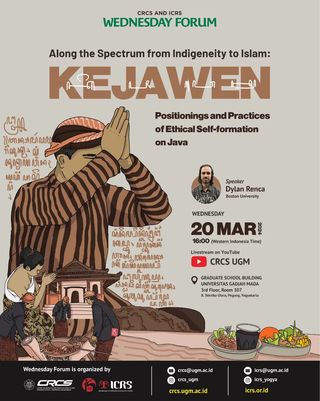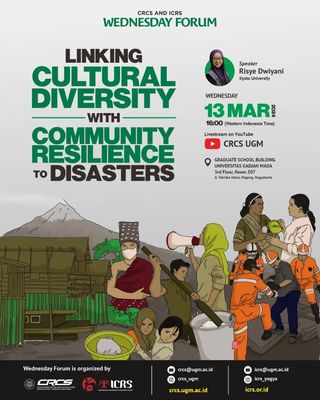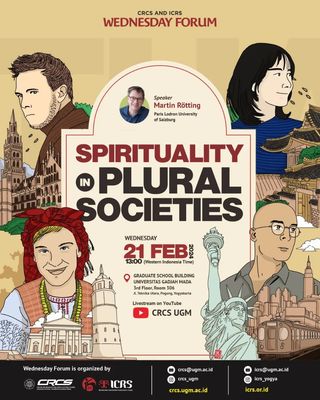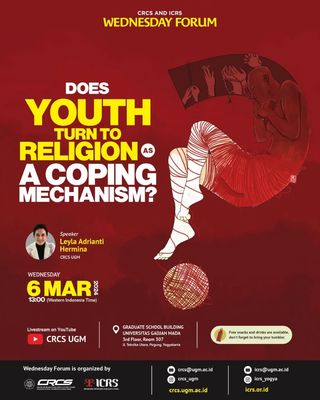
Online Conversations on Inter-Religious Studies presented by Ricardo V. Posada, Ph.D.
ICRS has been conducting doctoral-level education in interreligious studies for nearly 15 years. In the book entitled Dealing with Diversity Religion, Globalization, Violence, Gender and Disaster in Indonesia which contains writings from the thoughts of some of the founding figures of ICRS, it is stated that from the beginning, ICRS was intended to be a laboratory for dealing with diversity (2014: 23). Presently, ICRS has successfully graduated 53 doctoral students with 53 dissertations. In this regard, it is pivotal to ask how the concept of inter-religious studies is conceived in ICRS. One of the best ways to answer his question is by using the lenses of the 53 dissertations that have been produced by ICRS alumni. This is interesting because ICRS not only draws Indonesian students and scholars but internationals as well. ICRS students and alumni come from various parts of the Indonesian Archipelago and not less than 15 countries, including Bangladesh, Colombia, Egypt, The Gambia, India, Myanmar, The Philippines, Sierra Leone, Singapore, South Korea, Vietnam, and the United States. ICRS alumni also work in various professions such as academicians or lecturers in universities, civil society activists, lawmakers, and religious leaders. Therefore, the concept of inter-religious studies borne at ICRS impacts many countries and vocations. However, here Ricardo Vargas Posada, an ICRS alumnus from Columbia, is trying to answer the question about the concept of inter-religious studies in ICRS dissertations. The general findings of Dr. Posada regarding this question were presented to lecturers, students, and ICRS alumni on 2 February.
There are three main areas of interest in the studies at ICRS: social history of religion, comparative hermeneutics, and religion and contemporary issues. However, concerning the question, is the term "inter-religious" used in the dissertation? Posada found that 42% used the term inter-religious and 58% did not. Moreover, there are three dimensions of the dissertations: inter-religious (31 dissertations or 45%), intra-religious (11 dissertations), religious (11 dissertations). Regarding the thematic categories, Posada found that there are 19 dissertations (36%) which concern identity and 10 (19%) concerning exegesis. Interestingly, Posada found that interest in exegesis or hermeneutical issues was strong in the early years of the ICRS, but in recent years there has been less interest in exegesis. Furthermore, there are eight dissertations (15%) concerning gender issues, and these are mostly written by female students. There are also seven dissertations concerning peacebuilding, 4 dissertations concerning environmental issues, and 5 dissertations concerning other issues like art or the economy.
Moreover, regarding theoretical trends, those 53 dissertations can be categorized into seven theoretical frameworks: hermeneutics, Critical Discourse Analysis (CDA), theories of social identity, liberation theology, tafsir; phenomenology, and eco-theology. About theoretical frameworks, the recurrent names used in the dissertations include Michael Foucault, Pierre Bourdieu, Sherry Ortner, Max Weber, Robert Schreiter, James Scott, Stuart Hall, and William Sewell. Nevertheless, the next question is how the term inter-religious studies is used in the dissertation? Posada explains that the term inter-religious is also used in a wide variety of research and pertains to a wide variety of topics. From 31 dissertations that used the term inter-religious, there are 14 dissertations (45%) that used the term in relation with identity; six (19%) in relation with exegesis; six concerning peace-building; two (6%) about environmental issues; two in relation with the economy and one dissertation in relation to art. This data shows that the theme of dissertation research may vary and it also reminds all ICRS students to be open to issues that get less attention like art, economy, science, media, or even health. Therefore, Posada has some suggestions related to future research in ICRS to develop inter-religious studies in Indonesia. First, ICRS needs to emphasize the importance of research methods and methodologies among students. Second, ICRS needs to attract more women, more students from different religious persuasions, and more international students. Third, ICRS needs to prioritize key areas of research and invite students to participate in current research projects. And fourth, expand the academic network and strengthen student exchanges.
Finally, it can be conceived that the concept of inter-religious studies in ICRS is applied in multifaceted ways within these 53 dissertations. ICRS brings the theological approaches of religions like Islam, Christianity, Hinduism, Buddhism, and others into dialogue with the approaches of the social and human sciences. ICRS mixes theological approaches and religious studies and demonstrates a constructive interaction between theology and religious studies in the context of a multicultural society like Indonesia. Productive dialogues can take place between the social and human sciences and religion or theology (2014:37). Inter-religious studies at ICRS not only contemplates the particular context of plurality but also takes into account theological perspectives offered by various religious traditions and communities. Inter-religious studies, hence, are to be accountable in the form of social science and at the same time speak understandably to religious communities (2014:366). Therefore, it can be conceived that in the context of Indonesia’s pluralistic society, inter-religious studies offer rich prospects for inter-religious and inter-disciplinary dialogue that can help our multi-religious, multi-cultural societies learn to deal with diversity (2014:43).









